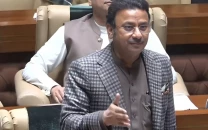Sindh govt depts bypass legal binding
Audits reveal various provincial govt departments have eschewed opening tenders by splitting sanction order

PHOTO: FILE
According to Sindh Public Procurement Rules (SPPR) 2010, each department is bound to fulfil the legal formalities for expenditures worth over a hundred thousand rupees. Under the law, the departments are legally bound to advertise its procurement plan through the Sindh Public Procurement Authority’s website as well as the print media. However, different departments have, in an underhanded attempt, bypassed the binding by splitting the procurement cost to into smaller amounts, as disclosed in Auditor General of Pakistan Audit Report, 2018-199.
As per the report, splitting procurement amount to avoid going into the open tendering process is prohibited under the law. Rule 12 (1) of the SPPR states that all proposed procurement for each financial year shall proceed accordingly without any splitting or regrouping of the procurement already grouped, allocated and scheduled in the Procurement Plan.
According to the report, during the audit of the irrigation departments for the financial years 2016-17 and 2017-18, it was observed that an expenditure of Rs 48.690 million was incurred on works awarded to various contractors through splitting up sanction orders to avoid sanction of the competent authority and open tenders.
Dispute emerges: HEC buyer gets legal notice for ‘illegal’ use of trademark
Similarly, the Sindh home department also spent over Rs 25.615 million during the year 2016-17 on the supply of various items by splitting the sanctioned amount. The audit was of the view that the management’s failure to follow SPPR resulted in the non-achievement of market competitive rates.
Likewise, different offices of the Sindh population welfare department too spent over Rs 8.151 million during the financial year of 2017-18, whereas the department’s Kashmore-Kandhkot and Qambar-Shahdadkot offices spent around Rs 2.74 million and Rs1.70 million respectively, the same way. Other departments’ offices that also adopted the splitting tactic to avoid opening tenders spanned Sukkur, Thatta, Naushero Feroze and Larkana districts.
Furthermore, in an audit of the Darul Atfal deputy director’s office in the Hyderabad welfare department, it was found that an expenditure of Rs 9.629 million was made by splitting the sanctioned amount to avoid open tenders, along with various other irregularities. The auditor also observed a similar trend during the audit of the principal’s office at the Government Degree Girls College in Orangi Town, for the year 2016-17, where the department had made procurement worth Rs 5.036 million from a single vendor using the same tactic.
The audit of the chief administrator’s office in the Sindh Auqaf department revealed an expenditure of Rs 6.775 million for installing walkthrough gates at various dargahs, during the financial year 2016-17.
Adding to that, officers in the Sindh Environmental Protection Agency in Karachi also followed this practice during the financial year 2016-17. Similar to the aforementioned departments, the auditors noted that an expenditure of Rs 7.856 million was made during this year by splitting up of the sanctioned order.
On the same note, officials of the health department spent Rs 148.351 million for the supply of various items, while the Board of Revenue accounted for an expenditure of Rs 21.846 million during the financial year 2017-18. In both cases, open tenders were once again avoided by splitting the sanction order.
Long arm of law(yers): Intimidation bid ends in court brawl
According to a source related to the Sindh finance department, the practice of splitting sanctioned amount has been a recurring issue within the government departments, ever since the promulgation of the SPPR in 2010. “There seems to be a chain of officers in each department who want more financial benefits from each work order in the form of commissions and kickbacks and hence they’ve adopted this tactic,” the source disclosed.
The Express Tribune tried contacting finance department secretary Syed Hassan Naqvi and planning and development department secretary Dr Shireen Mustafa for official comments on the issue, but neither could be contacted despite multiple attempts.
However, Ghulam Qadir Chandio, the chairman of the Sindh Assembly’s Public Accounts Committee, told The Express Tribune that the committee had not yet taken up the issue. “But now that I’m aware of it, I will seek answers from the relevant Sindh government officers at the next meeting,” he concluded.
Published in The Express Tribune, February 22nd, 2020.



















COMMENTS
Comments are moderated and generally will be posted if they are on-topic and not abusive.
For more information, please see our Comments FAQ